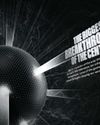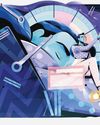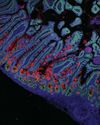
As artificial intelligence (AI) improves, artists are finding themselves in unprecedented territory. Realistic images are being made in seconds; millions of them are created each day; and the images are being entered into and winning art competitions. But none of them are being made by humans.
We spoke to Ahmed Elgammal a professor of computer science at Rutgers University to find out about the rise of AI art and what it means for human creativity in the digital era.
HOW DO AI IMAGE GENERATORS WORK?
Five years ago, there was an advancement in AI known as Generative Adversarial Networks (GANs). It took images and tried to generate similar results. Give it images of cats and it would return completely new versions to match. This was revolutionary and many artists started using it. Then came a newer generation that used text to generate images to give more control over what was being generated. This worked by training the model on lots of images and their accompanying text caption to understand how the words relate to the images. So in an image of a bird on a tree, the AI guesses where the tree and bird are and the network tells it if it’s correct. By doing that for billions of images, the AI figures out what words relate to what images.
WHY DO THESE AI MODELS STRUGGLE WITH COMPLICATED SHAPES?
هذه القصة مأخوذة من طبعة June 2023 من BBC Science Focus.
ابدأ النسخة التجريبية المجانية من Magzter GOLD لمدة 7 أيام للوصول إلى آلاف القصص المتميزة المنسقة وأكثر من 9,000 مجلة وصحيفة.
بالفعل مشترك ? تسجيل الدخول
هذه القصة مأخوذة من طبعة June 2023 من BBC Science Focus.
ابدأ النسخة التجريبية المجانية من Magzter GOLD لمدة 7 أيام للوصول إلى آلاف القصص المتميزة المنسقة وأكثر من 9,000 مجلة وصحيفة.
بالفعل مشترك? تسجيل الدخول

THE WORST IDEAS OF THE 21ST CENTURY
NOT ALL IDEAS CAN BE HITS. ALONGSIDE GROUND-BREAKING INNOVATIONS, 21ST-CENTURY SCIENTISTS HAVE HELMED THEIR SHARE OF WILD TECH FLOPS, DUBIOUS THEORIES AND OVERHYPED BREAKTHROUGHS. HERE ARE THE BIGGEST TO FORGET

10 IDEAS THAT WILL SHAPE YOUR NEXT 25 YEARS
Predicting the future is considered a fool's game. But it's one many of us like to play.

THE BIGGEST BREAKTHROUGHS OF THE CENTURY
We're a quarter of the way into the new century. To mark this milestone, we asked the UK's top minds to highlight some of the game-changing scientific breakthroughs shaping our world since the year 2000

DO THE SCIENCE COGNITIVE SHUFFLE
Trouble sleeping? A lot on your mind? Use this trick and sedate your synapses

WHAT DETERMINES HOW MANY ABS I CAN GET?
Assuming you're a human being, you have exactly the same number of abs as everybody else: two.

HOW CAN I IDENTIFY MY PSYCHOLOGICAL BLIND SPOT?
In the 1950s two American psychologists, Joseph Luft and Harrington Ingham, proposed a way of thinking about psychological blind spots - things you don't know about yourself - that they called the 'Johari Window' (the term is a combination of their first names).

How can I change my personality?
Want to become more confident, extroverted or assertive? Science shows that with a few simple changes, you can unlock your best self

Could your cosmetics be harming your health?
Cosmetic companies are phasing out microplastics and so-called 'forever chemicals' to help protect consumers.

extraterrestrial US Congress is talking about activity again. Is the truth really out there?
Despite several testimonies, the question remains frustratingly unanswered

Map of 100 million human body cells revealed
Over three dozen new studies mark significant milestone towards complete Human Cell Atlas